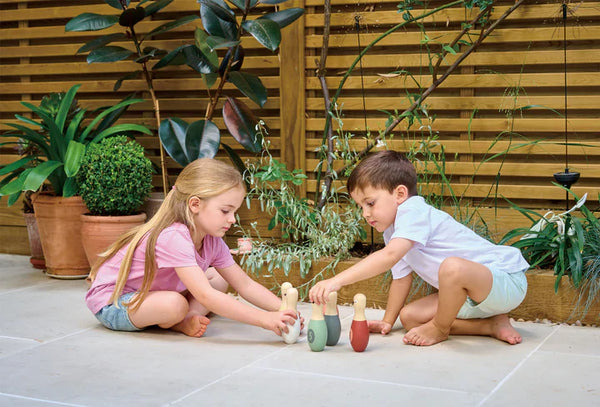How to Make Learning Fun with Wooden Puzzles and Games

As parents, we all want our children to have the best learning experience possible, but how can we make it enjoyable? The answer lies in the power of play, and one of the best ways to combine fun with education is through wooden puzzles and games. Not only are these toys great for cognitive development, but they also encourage hands-on, creative thinking that keeps kids engaged and entertained for hours.
At ThreadBear Design, we believe in the importance of learning through play, and we’ve curated a selection of beautifully crafted wooden toys that turn learning into an exciting adventure. Here’s how you can use wooden puzzles and games to make learning fun for your little ones.
1. Enhance Problem-Solving Skills with Puzzles
Wooden puzzles are a fantastic way to boost problem-solving abilities in young children. These puzzles require children to use their critical thinking and logic skills as they piece together shapes, images, or patterns. Take, for example, the Citrus Fractions Puzzle. This educational puzzle helps toddlers learn about fractions while offering them a fun, interactive way to explore mathematical concepts. It's a perfect example of how a simple wooden puzzle can introduce early math skills in an engaging way.
Another great option is the Clever Cat Memory Game. This memory game encourages children to use their memory and concentration to match animal faces. It’s a wonderful way to help young learners strengthen their cognitive skills while enjoying some friendly competition!
2. Foster Creativity and Imagination with Open-Ended Games
Wooden toys offer a unique advantage in that they encourage open-ended play. With no prescribed outcome or instructions, children can create their own scenarios, stories, and solutions. This type of play nurtures creativity and helps children develop essential skills like planning, organising, and role-playing.
For example, the Happy Folk Hotel is a fantastic toy for imaginative play. With its set of diverse, wooden characters, children can create their own stories, run a hotel, or engage in endless role-playing activities. This helps kids not only develop their imagination but also their social skills and understanding of the world around them.
3. Learn Numbers and Shapes Through Play
Wooden puzzles and games are excellent tools for teaching children basic concepts like numbers, shapes, and colors. Games like the How Many Acorns? counting game teach toddlers how to count and recognise numbers while making the learning experience fun and interactive. This toy comes with brightly colored acorn puzzle pieces that help children learn to match, count, and organize by number.
Additionally, the Rainbow Tunnel is a fantastic way for kids to explore shapes and colors. By stacking the wooden pieces, children learn about symmetry and spatial awareness, skills that are essential as they grow older.
4. Improve Fine Motor Skills with Stacking and Sorting Toys
Wooden stacking toys are not just fun but also incredibly beneficial for fine motor development. Toys like the Stacking Garden Friends encourage children to stack and sort pieces, strengthening their hand-eye coordination and dexterity. The tactile nature of wooden toys also helps with sensory development, as kids feel the smooth, natural texture of the wood as they play.
The Wooden Baby Blocks are another great example of how stacking and sorting can foster fine motor skills while allowing children to explore shapes, colors, and sizes. These blocks can be used for endless creative building, making them a must-have in any playroom.
5. Encourage Teamwork and Social Skills with Cooperative Games
Another great way to incorporate learning through play is by encouraging teamwork with cooperative games. The Tic Tac Toe game is a classic example that fosters turn-taking, strategy, and social interaction. These games teach children the value of playing with others and help them develop essential interpersonal skills.
Additionally, cooperative games can also be used to promote empathy and communication. Whether it’s a team-based puzzle or a game where players work together to complete a task, these activities are invaluable for teaching children how to work with others to achieve a common goal.
Make Learning Fun with Wooden Toys
Wooden puzzles and games aren’t just toys; they’re tools that can help develop essential skills in young children. From problem-solving to creativity and fine motor development, these eco-friendly toys are the perfect way to make learning fun.
By incorporating wooden puzzles and games into your child’s playtime, you’re not just giving them a toy – you’re giving them the gift of learning and growth. Start exploring our collection today and find the perfect toys to help your child thrive!
Table of contents
- 1. Enhance Problem-Solving Skills with Puzzles
- 2. Foster Creativity and Imagination with Open-Ended Games
- 3. Learn Numbers and Shapes Through Play
- 4. Improve Fine Motor Skills with Stacking and Sorting Toys
- 5. Encourage Teamwork and Social Skills with Cooperative Games
- Make Learning Fun with Wooden Toys















